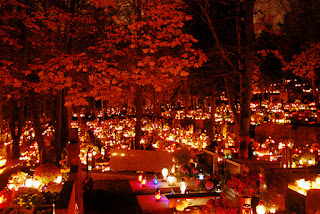Hello!
 As I can imagine today everybody in Poland is thinking
of All Saints’ Day which is celebrated annually on 1st November by
whole Catholic Church. This day is dedicated for all those who have attained
heaven and the following day, that is the 2nd November, known as All
Souls’ Day, which is dedicated to those who have died and not yet reached
heaven. In Poland during this day we are visiting graves of our families and
friends, we are decorating them with flowers and light candles and also we are
praying for our dead. In general it’s time of our reflection on life and death.
As I can imagine today everybody in Poland is thinking
of All Saints’ Day which is celebrated annually on 1st November by
whole Catholic Church. This day is dedicated for all those who have attained
heaven and the following day, that is the 2nd November, known as All
Souls’ Day, which is dedicated to those who have died and not yet reached
heaven. In Poland during this day we are visiting graves of our families and
friends, we are decorating them with flowers and light candles and also we are
praying for our dead. In general it’s time of our reflection on life and death.
But have you ever wondered how these days are
celebrating in the others countries? Are there some differences or special
habits?
Today I want you to say how it goes in France
and Spain.
Let`s move to Spain.
A typical Spanish cemetery is completely
different than in Poland. It looks like a park of the tombs, where ashes of
dead are placed. Every tomb is closed by a plaque with the name of dead and people
put flowers on the hangers or vases which are attached to this plaques.
 In some small villages during “All Saint’s Day”
people are kindling a fire to show the way to get back home for dead. In the Nord of Spain, there is a tradition to
make “The ritual of souls” during the
night from 1st to 2nd November. It’s a procession of
citizens in which they are divided into smaller groups, that is, on those who
are unmarried, single and the others. They have a light candles and they sing a
traditional “Song of the souls”. After
every strophe they say Our Father prayer. When the procession finishes, priest gives
cakes and wine to participants.
In some small villages during “All Saint’s Day”
people are kindling a fire to show the way to get back home for dead. In the Nord of Spain, there is a tradition to
make “The ritual of souls” during the
night from 1st to 2nd November. It’s a procession of
citizens in which they are divided into smaller groups, that is, on those who
are unmarried, single and the others. They have a light candles and they sing a
traditional “Song of the souls”. After
every strophe they say Our Father prayer. When the procession finishes, priest gives
cakes and wine to participants. In Catalonia after getting back from cemetery people eat small marzipan cookies, called “The saint’s bones” because it’s believed that every eaten cookie release the soul of dead from purgatory, and the fact that they are eating “The saint’s bones” means that they love their dead.
In common with many festivals throughout the
country there are a number of special dishes which are associated with All
Saint’s Day. Chief amongst these is the tradition of eating roasted chestnuts. The
chestnut element of the tradition comes from the legend of Maria La Castañada,
a chestnut seller, about whom there are many stories.



Wow, I really like your blog!
ReplyDelete